Keeping Passover
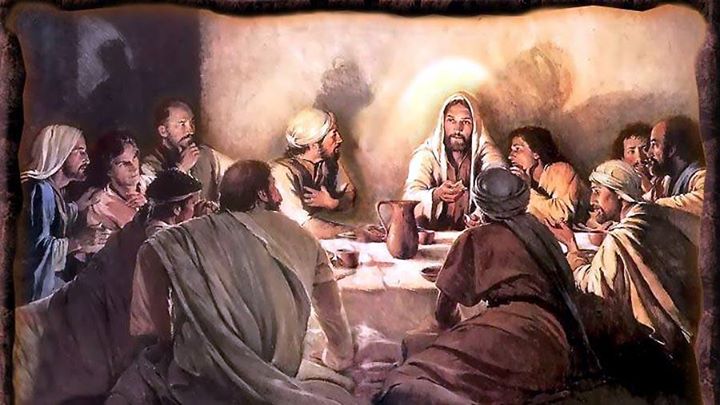
The following represents my understanding of how/when to eat Passover as a Believer in Yeshua, still in the Diaspora. I reserve the right to be wrong. So please do your own research, and prayerful study of Scripture in order to form your own convictions.
A few things to note starting off:
1) Passover is to be done FOR EVER. This is repeatedly stated in the Torah. Seeing as YHWH Himself gave the instructions, I know this means FOR EVER and it’s NOT “poetic language” and it does not mean that it would somehow stop after sending His Son.
2) When John the Baptist, the LEGITIMATE High Priest of his day, saw Yeshua, he declared, “Behold the Lamb of God, which taketh away the sin of the world.” (John 1:29). Thus, Yeshua is my “Passover Lamb” and the final sacrifice for sin (read the book of Hebrews).
3) As a former Gentile, now a Believer in Yeshua, thus coming into covenant with YHWH, having accepted His ONE TIME sacrifice, I have become a grafted in branch of the Cultivated Olive Tree, which is Israel (Romans 11) and have thus become a member of the “commonwealth of Israel” no longer a “stranger of the covenants of promise” (Ephesians 2:8-13), but rather a joint-heir to the promises of Abraham (Galatians 3).
4) Paul makes it abundantly clear that our “works” do not save us and never could (Ephesians 2:8,9). It should be noted that the Law of YHWH is NOT a curse. It is a perfect, life-giving, blessing to those who keep it (read Deuteronomy 30 and Psalm 119). The “curse of the Law” Paul refers to in his writings only comes from disobedience to it. Otherwise, the Law brings tremendous blessing. You can read the blessings and curses in Lev. 26 and Deut. 28. And again, see also David’s take on it in Psalm 119. James said “faith without works is dead.” (James 2:20). And John said we demonstrate that we “love God” when we “keep His commandments.” (1 John chapters 2 – 5). Thus, we do NOT keep the Commandments FOR salvation, but rather we find that obedience SHOULD be a manifestation that shows we ARE saved. John makes this crystal clear in 1 John 2:1-6. Which is why Paul said, “What then? Shall we sin (defined in 1 John 3:4 as transgress the Law), because we are not under the law, but under grace? GOD FORBID.” Paul actually says that twice in the same chapter. A good exercise to help you “get Paul” is to read the Torah through a few times. Then read the book of Hosea a few times. Then read the Gospels a few times. Then read 1 John a few times. Then read James a few times. Then read the book of Hebrews… all before even thinking of reading the book of Galatians or anything else Paul wrote. Once you’ve laid a proper foundation of understanding what Paul read, then you can begin to “get” what Paul wrote. Comparing the book of Romans (specifically chapters 7 – 11) with what you learned in the book of Hosea is also especially helpful. And before being tempted to pull the Colossians 2:16 card, please read: Twisting and Distorting Colossians 2:16.
All this being established ahead of time, let’s return to the issue of Passover. When do we keep it and how? Again, this is just my understanding, so pray and arrive at your own convictions…
When is Passover?
It is the 14th day of the first month of the Hebrew calendar, given to the Israelites by YHWH Himself. This date slides on the Gregorian calendar as they are not compatible. There are differing views as to how to reckon the start of a month, but I think most are in agreement that it begins after the Spring/Vernal Equinox. From that point, they look for the “new moon” to start the first month of the year. Some reckon the new moon by the conjunction (when it is unseen) and others by the first sliver of the moon after the conjunction. I used to believe the former view (conjunction), but have since come to accept the latter (first sliver). From the start of the first month, we count 14 days, which is the day of Passover (Nisan 14). This year – depending on which method of counting you use – I believe the date falls on either April 6th, 7th or 8th.
Many in the Enoch/Zadok calendar camp will do it tomorrow, April 6th. Others on the 7th and the traditional Jews will do it beginning at sundown on the 8th. You will have to do your own study of the different calendars and come to your own conclusions as to which one you feel is “correct” and why.
The thing about the Enoch/Zadok calendar that makes sense to me is April 7th of this year is a full moon, which is the 15th of the month, so that would make April 7th on the Gregorian calendar, Nisan 15 of the Hebrew calendar, with the first day of Unleavened Bread occurring appropriately on a full moon. Thus, it seems to me that April 6th of is the best date for Passover this year. But that’s just my opinion. Again, you’ll have to study this stuff out for yourself and come to your own conclusions.
How to celebrate it? Well, again, many different views exist. I would suggest you read:
Those were the instructions given by YHWH through Moses to Israel. Takeaways I get from this reading, in a post-cross, four Gospels, Romans 11, 1 John 5, book of Hebrews mindset…
1) The first Passover was done in haste in their homes (Exodus 12:11) as it marked the end of the judgments of the 10 Plagues against Egypt and the beginning of their Exodus out of bondage. But in Deuteronomy 16, the commandment changed to “sacrificing” the lamb in the place where YHWH would “choose to place His name” (which would be Jerusalem). And by that time, the sacrifices were to be performed by the Levitical priesthood. Since I am not a Levite, nor in Jerusalem, technically speaking, I can’t properly “keep Passover” as commanded anymore than the Israelites could while in Babylon. I can only “rehearse” it as best I can in remembrance. In this regard, please see the following New2Torah video:
2) Yeshua longed to have a Passover meal with His disciples before He was to be killed. When He finally did so, He said, “Do this in remembrance of me.” (Luke 22:19). The THIS He was doing was Passover, it was not some new ritual called “Communion” or “the Last Supper.” Passover was always to be a meal of remembrance (refer back to the Torah references above). And Yeshua was continuing that tradition, by telling them to remember HIS sacrifice that was about to take place. Now, I don’t see Him saying to forget what happened during the Exodus, so I take this to mean, remember BOTH – as they are connected.
3) So, do we “sacrifice lambs” in our backyards? My understanding of Deuteronomy 16:5 and 6 would dictate that we should not:
Deuteronomy 16:
5 Thou mayest not sacrifice the passover within any of thy gates, which the Lord thy God giveth thee:
6 But at the place which the Lord thy God shall choose to place his name in, there thou shalt sacrifice the passover at even, at the going down of the sun, at the season that thou camest forth out of Egypt.
7 And thou shalt roast and eat it in the place which the Lord thy God shall choose: and thou shalt turn in the morning, and go unto thy tents.
This seems quite clear to me. We are NOT to sacrifice within our gates. But rather at the place where YHWH put His name. We see throughout the Scriptures that the geographic location He chose to do this was Jerusalem. Yes, we are now the “temple of the Holy Ghost” and He has placed His name in our hearts too, but it’s kinda hard to kill a lamb in our heart wouldn’t you agree? So, frankly, even though I could never see myself killing a lamb (or anything else for that matter), I see no Biblical justification for doing such a “sacrifice” on our own properties based on the above commandment.
Now, having said that, I see nothing wrong with killing and eating a lamb on your property. You’ll note the quotes I put around “sacrifice” in the paragraph above. This is because if you are going to consider it a “sacrifice,” then it can’t be done on your property as per Deuteronomy 16. HOWEVER, if you are simply preparing a meal for yourself and your family and you live on a farm or on a property that would allow you to have a lamb, there does not appear to be any problem with doing so Scripturally. To this end, I’ve had some rather heated debates on Facebook and elsewhere with Christians who freak out over this. One meme I recently posted stated:
No one flipped out about eating pork for their Easter ham. So, why freak out about eating a lamb for Passover?
Can we still eat a lamb in remembrance? Sure. Why not?? Again – so long as it is understood that YHWH sent His Son to be the FINAL sacrifice, and thus you are just eating a meal of remembrance and not a “sacrificial lamb.” In this regard, in another FB post, I wrote:
Funny how Christians will flip out over killing and eating a lamb for Passover, but have no problem hunting for deer, fishing or even buying meat at the supermarket and eating it. Worse yet, they have no problem eating an Easter ham. Something is seriously messed up in their heads when it comes to this deal. So, I’ll try to help some of you out…News Flash: ALL meat that ends up on your plate, started out as a living animal, someone had to kill and prepare in order for you to eat it. I can’t believe I actually have to explain this.
So the argument goes, why not properly raise, kill and eat a lamb according to Scripture, rather than take a chance on how someone else raises and kills the lamb you may buy at the store? This to me is a reasonable argument. If you are going to eat a lamb, the cleanest way to do so, if you are able to, is by preparing it yourself. And I see nothing at all wrong with that.
Others argue that if Yeshua is the true sacrificial Lamb, do we even need to eat lamb at Passover? I leave you to pray about that and decide the answer for yourself.
Another question that often comes up regarding the lamb is whether or not we should still put blood on the door posts of our homes. As far as I can tell from Scripture, (and Jewish tradition even to this day for that matter) the answer is, no. It was only for the event of the Exodus itself, to be a sign for the death angel to pass by. It is never again mentioned as a thing to do. And as a Believer in Yeshua, I also believe we are already “covered in the blood,” so this activity is not necessary.
4) When do we eat Passover? The command is to do so “between the two evenings.” In Exodus 12:6 we read,
Now you shall keep it until the fourteenth day of the same month. Then the whole assembly of the congregation of Israel shall kill it at twilight [see “between the evenings,” KJV marginal notes; “betwixt the evenings,” J.P. Green; “between the two evenings,” Bullinger’s The Companion Bible; and The NIV Study Bible].
This can be a bit confusing. And it also plays into the whole “when does a day really begin?” argument too. I’m not going to “go there” with this post. For more study on this issue, please consider the following detailed articles on when Yeshua had His Passover meal:
and
See also:
Since the command is to eat the Passover “between the two evenings” this chart helps to show how Yeshua and His disciples did just that:
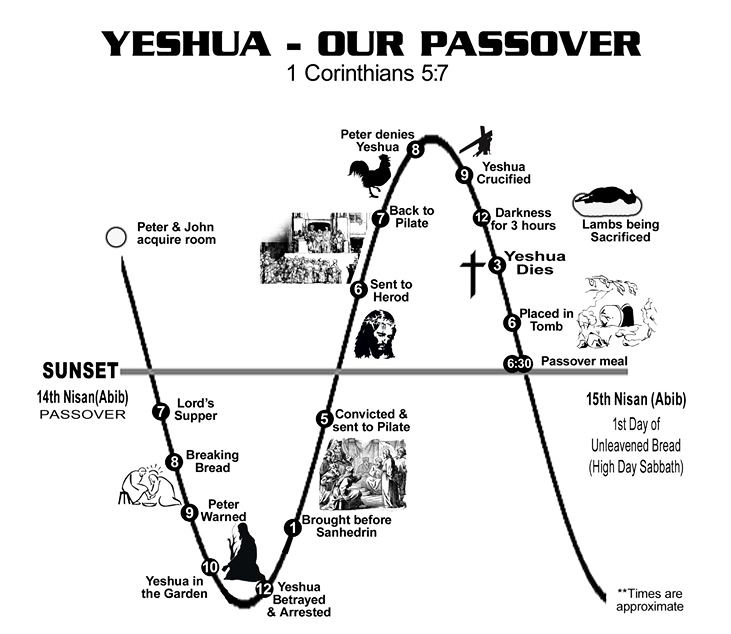
5) What to eat and how to celebrate Passover? There are many “traditions” for doing this. Here is a good reference for the traditional Passover meal, known as a Passover Seder:
See also, The Capernaum Passover Experience: I’ve been to this one and thought it was quite good. Apparently, they’ve begun an on-line experience too, which begins tonight (April 5th) at 8pm CST: https://www.capernaumvillage.com/passoverexperience.html
In regard to both of the above, I see no requirement in Scripture for the egg. Not saying there’s anything necessarily wrong with having it, I just see no requirement for it. And on the Capernaum Experience site, they have a “chicken bone” listed in their meal prep prep instead of lamb, which likewise has no Biblical precedence, so take that for whatever you feel it’s worth. As for the various cups, and when to drink them, I do see evidence that Yeshua was following this tradition Himself, which I think is pretty cool. Whether or not you use alcoholic wine or just grape juice… I’ll leave that for you to pray about and follow your own convictions.
What we typically do in our fellowship is have the lamb, bitter herbs, unleavened bread and wine, while loosely following the format given in the traditional Passover Seder. We then recount the story of the Exodus and parallel it with the Passion of Christ and what He did to deliver us from the bondage of sin and death. Pretty simple. It’s meant to be a meal of remembrance and celebration. So, that’s what we do. This is also a great video to watch and play if you have guests:
6) Who can and who cannot partake of Passover? Well, let me start this by saying that circumcision is NOT required >> FOR << salvation (see Acts 15). It is however required of all males who would like to partake of Passover:
Exodus 12:
43 And the Lord said unto Moses and Aaron, This is the ordinance of the passover: There shall no stranger eat thereof:
44 But every man’s servant that is bought for money, when thou hast circumcised him, then shall he eat thereof.
45 A foreigner and an hired servant shall not eat thereof.46 In one house shall it be eaten; thou shalt not carry forth ought of the flesh abroad out of the house; neither shall ye break a bone thereof.
47 All the congregation of Israel shall keep it.48 And when a stranger shall sojourn with thee, and will keep the passover to the Lord, let all his males be circumcised, and then let him come near and keep it; and he shall be as one that is born in the land: for no uncircumcised person shall eat thereof.49 One law shall be to him that is homeborn, and unto the stranger that sojourneth among you.
From the above, I take it that no male shall eat of Passover without being circumcised. Neither should a foreigner (to the covenant of YHWH). So, this then becomes a matter of personal conviction. And you can’t just go the “circumcision of the heart” only route here as the specific requirement is for males. This tells me it is a physical issue, not a “heart” issue. If you are a male, grafted in member of Israel (Romans 11/Ephesians 2), then these are the requirements YHWH gave for eating Passover. I didn’t write it. I’m just showing you what it says. And I repeat, it is NOT a requirement FOR salvation! But if you are saved, you are now part of Israel. If you therefore wish to partake of Passover (as a male), then the above Scripture seems quite clear. No one is likely to be checking your penis at the door, so you then must decide for yourself before YHWH whether or not you want to keep your foreskin or keep Passover because according to that text, it is clear you can’t keep both.
7) What’s next? Well, Passover is actually the start of a week long celebration. Passover is Nisan 14. The next day, Nisan 15, is considered a “High Sabbath” day of rest and the start of the Feast of Unleavened Bread (Lev. 23:6-8). So, the thing to do before Passover, is rid your home of all leavened products (breads and such things as contain yeast). Some say this is about “getting the sin out” of our homes. While there is certainly Biblical precedence for this principle and it’s a good thing to do in general, the commandment itself IS talking about baking goods. Thus, beginning with Passover and going through to the end of Unleavened Bread, you are to eat unleavened bread (along with whatever else you may eat that week). So, clean out the leaven first. Then eat unleavened bread from Nisan 14 (Passover) through to Nisan 21, which is the seventh day of Unleavened Bread, and also a Sabbath rest day (Deuteronomy 16:8). Seeing as most of us are in lockdown anyway, it should be easy to take the 1st and 7th days of Unleavened Bread off and rest, reflecting on the things of YHWH – all the more so in these troubled times.
Additional reference videos and notes regarding Passover can be found on my Virtual House Church website:
For more on Passover and the other “moedim” see also: http://www.virtualhousechurch.com/OutOfBabylon
Again, I am not saying I have all of this right. There are probably plenty of things here that lots of people will disagree with for a variety of reasons. That’s fine. Again, read, pray and ask the Holy Spirit to lead you to the truth and walk it out accordingly.
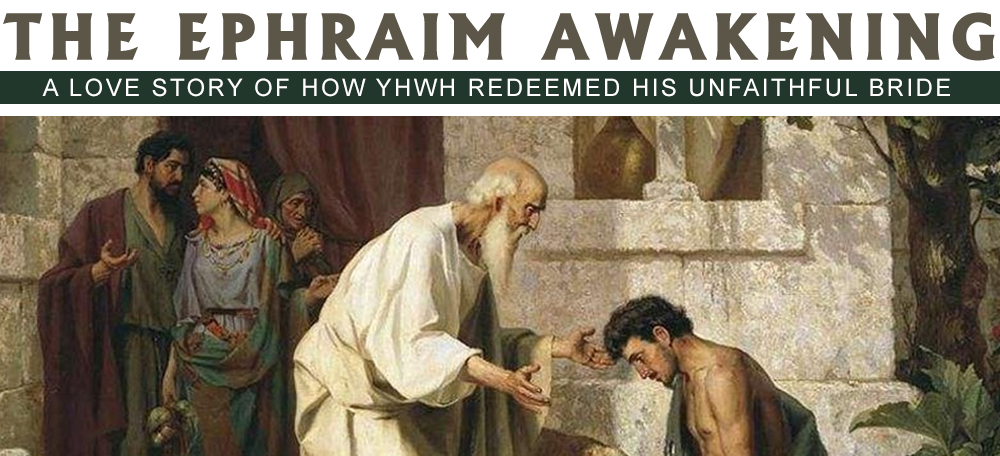

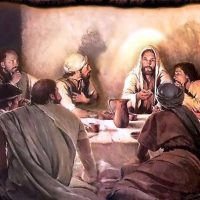

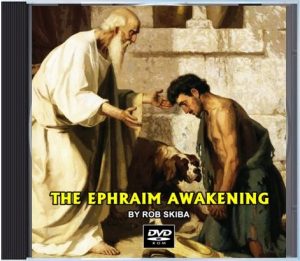


Leave a Reply